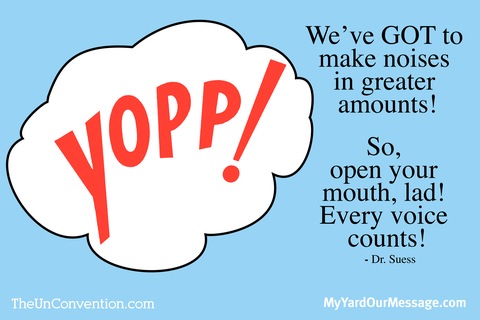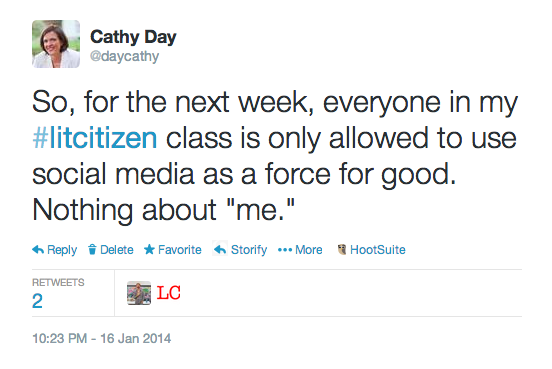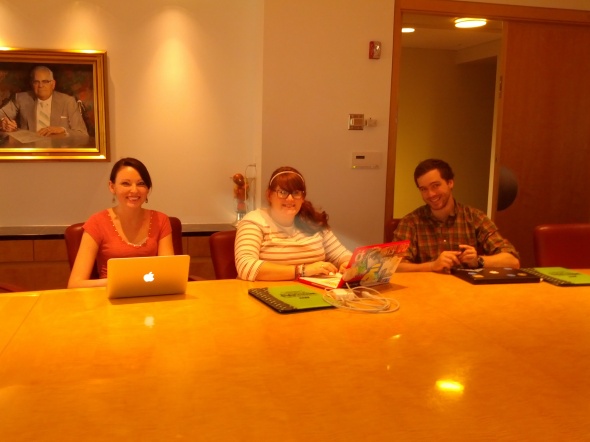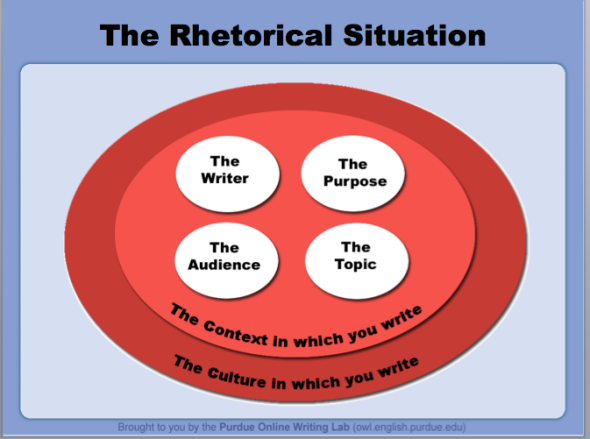Books change lives
Posted: April 24, 2014 Filed under: Guest Posts, Online Community 1 Comment In case you were thinking that I was teaching students how to be “hype-machines” in my Literary Citizenship class, check this out from my student James Gartner:
In case you were thinking that I was teaching students how to be “hype-machines” in my Literary Citizenship class, check this out from my student James Gartner:
Literary citizenship isn’t just about engaging people who already love to read or write and talk about books, but also about expanding the literary world. Books can change lives and influence attitudes for good or ill.
Read the rest of his excellent round-up post here.
Can I get 100 AWP members to vote–again?
Posted: April 24, 2014 Filed under: Actions, Online Community | Tags: AWP 1 CommentLet’s practice some genuine literary citizenship, people. Let’s do something positive.
AWP is this close to having a quorum. They are at 54%. They need to get to 60%. By next week!
Incentive for them: If they get to 60%, they save beaucoup bucks in legal fees, and they’re better equipped to serve you.
Incentive for you: You can win a Kindle Fire or Paperwhite. Plus, you know, making a difference and all that.
Just go here and vote.
Even if you voted last year–the last time I tried to help in this effort–you have to vote again!
How should you vote? Vote yes or no. Doesn’t matter. Just vote.
Who should vote? Every freaking body. Tenure-track faculty. Non-tenure track. Individual members.
What are you voting for? Here’s the explanation from my friend and colleague, Jill Christman, member of the AWP board.
We are closer than we have *ever* been to reaching the quorum necessary to reform AWP’s governance and enter this millennium with pens poised. AWP’s current articles of incorporation and bylaws have many vestigial remnants from the 1960s and 1970s, when AWP was a much smaller organization. We need new bylaws and articles to help AWP to better serve a more diverse and bigger association. Regional representation of the programs and faculty will continue in the new system of governance, with the regions expanding from five to six groups of membership. Each of the new Region Councils shall have a representative on the board, as the regions have now.
The last call for votes brought us up a couple percentage points, but we’re not to 60% yet, and we need to get there before the end of this semester.You don’t have to vote “yes.” You don’t even have to vote “no.” You simply have to register your presence. Let us know you were there. Remember, the voting cycle started anew in Fall 2013, so if you voted *before* that, do it again now.
Remember the final pages of Horton Hears a Who? The mayor tearing up those fabulous Seussian staircases in Whoville with his megaphone in search of that single shirker? That final, critical, town-saving “Yopp”? Go find the Jo-Jos in your program and encourage them to put down their yo-yos and vote. We can do this.
After you vote:
- Leave a comment here.
- Tweet “I voted in the AWP election. I’m a #litcitizen” and I’ll see it.
- Share this link on Facebook and rouse YOUR friends into a voting frenzy.
- Let’s do something positive.
A Better Place For Readers
Posted: April 8, 2014 Filed under: Definitions, Guest Posts, Online Community Leave a commentThese are excellent questions: What are some books that you needed and didn’t know about? What are some books that you had that helped you figure things out? And how are you making sure that other people know how great they are?
When we talk about Literary Citizenship, it seems like we say a lot about making the world a better place for writers, and getting people interested in books. Which they definitely should be. But maybe we should start talking about how to make the world a better place for readers too. Let me explain. As a kid, reading was such an important part of my life. I read on the toilet, at recess, when I should have been sleeping, during church.
 One series that I loved with all of my heart was A Series of Unfortunate Events by Lemony Snicket. What made it so great was that Violet Baudelaire, the oldest, was a girl like me and she was the one who was generally in charge, saving the day, fixing everything. As a kid who was also, incidentally, a girl, and someone not very in control of the events in her life…
One series that I loved with all of my heart was A Series of Unfortunate Events by Lemony Snicket. What made it so great was that Violet Baudelaire, the oldest, was a girl like me and she was the one who was generally in charge, saving the day, fixing everything. As a kid who was also, incidentally, a girl, and someone not very in control of the events in her life…
View original post 438 more words
Form a Blog Circle
Posted: May 16, 2013 Filed under: Online Community | Tags: AWP, blogging, literary citizenship, Making a Literary Life 3 Comments I gave the Discovery 2013 interns some “Summer Homework.”
I gave the Discovery 2013 interns some “Summer Homework.”
Why?
Many of these students were in my Literary Citizenship class this spring, but some were not, and so we’ve decided to spend the 10 weeks leading up to the conference doing some training via “homework.”
Every Friday by 3 PM, they’ll engage in something I call “Charming Notes.” It’s a version of what Carolyn See prescribes in her book Making a Literary Life. They’ll be required to friend or follow or engage with five people, writers, magazines, agents, or publishers in order to expand their literary horizons. (We did this in my class during Spring 2013, and it worked wonders.) One of those five must be an “active” note–meaning they have to say something to the person, comment on a blog, send an email or message, not just passively follow someone.
Every other Friday by 3 PM, they’ll post to their blog. I’ve told them that these posts can be:
- journal entries
- book reviews/what they’re reading
- commentary about articles they read while preparing for MWW
- interviews with writers
- a roundup of links to helpful articles or information
- fearful questions and anxieties
- a response to someone else’s blog post
- I’ve recommended that they use my blog Literary Citizenship for inspiration, esp. the links in the right-hand column.
I’ve warned them: “You can blog about or share your own writing, but primarily, the goal is to be interested in what other people are doing, not what you’re doing.”
They must read ALL of each week’s posts (5 or 6) and comment on them. In a sense, they will “workshop” each other’s posts, but in a supportive, helpful way. Such as, if they think the post could be formatted more attractively or they catch a typo, they should tell the person in our private FB group (only we see that). But if they want to engage in a conversation with the post, they’ll do that in the comments section.
Basically, I’ve created a blog circle.
Ultimately, I want each intern to find the community they need and blog about whatever they need to blog about, but I also want them to form a community among themselves.
The internet is about circles and communities and connections. Our job is to find the right ones to plug into.
A metaphor: going online at first is like being a boat drifting in the middle of the ocean. You write into a void. No one can find you. You’re a needle in a haystack. You’re not even a ping on anybody’s radar.
What you have to do is find some other boats and tie yourselves together. Not just any boats. The right boats. Boats like you.
Hang out with them. Talk. Learn. Eat. Plus, you’re more visible to search parties.
Who’s in your blog circle? If you don’t have one, think about how to find one.
An example: I just proposed a panel for AWP 2014 in Seattle on teaching novel writing. The first people who came to my mind were people I’ve met via social media who share my interest. John Vanderslice comments on my blog “The Big Thing” quite often because he teaches a similar class. Then there’s Roxane Gay and Jon Billman, with whom I talk about the subject on Twitter from time to time.
They sent me Charming Notes, or I sent Charming Notes to them.
That’s the benefit of being online, I think: that when particular opportunities arise, names come to mind.
The Next Thing: Professionalization in Creative Writing
Posted: March 24, 2013 Filed under: Online Community | Tags: blogging, Dinty Moore, jobs, Making a Literary Life, Making a living, professionalization 1 Comment Not every Creative Writing major wants to go to grad school, and to be honest, I’m not even sure if most of them want to be published writers. What brings them to our classes, I think, is a desire to be connected to the world of books. This essay by Dean Bakopoulos speaks to that desire.
Not every Creative Writing major wants to go to grad school, and to be honest, I’m not even sure if most of them want to be published writers. What brings them to our classes, I think, is a desire to be connected to the world of books. This essay by Dean Bakopoulos speaks to that desire.
Creative writing isn’t a pre-professional discipline. We’re not like some academic majors which prepare students for a concrete, discernible “next thing,” such as graduate study, this job, that career path. When my students say, “What I can do with this degree?” I talk about “transferable skills.” I point them in the direction of the career center.
To be honest, I hate it when they ask me that question, because I know there are no easy answers.
Here’s an answer from a great writer, teacher, and literary citizen, Dinty Moore. (He posted this on Facebook a few days ago, and I hope he doesn’t mind my sharing it here.)
Dear E****
The short answer is that you will have to be creative in your job search if you major in poetry: you might end up working in editing or publishing or you might end up in a field entirely unrelated. This is hard for parents to understand, but students often end up finding careers well outside of their majors no matter what they choose. I have spent most of my life around writers, poets, painters, dancers, actors, and though many of them wait tables, tend bar, sell real estate, or do data entry, none of them in my experience is actually starving to death. People find ways to survive and still do what they love. Of course, your parents want you to choose accounting and then go immediately into an accounting job and stay there all of your life, so they never have to worry about you. I understand that impulse: I have a daughter as well. That is just something you’ll have to work out, based on your relationship with your parents, how badly you want to be a writer, and other factors.
But here’s the deal: just because it’s hard to answer the question “What can I do with this degree?” doesn’t mean it’s not a fair question. We should try to answer it. And every school, every program DOES try to answer that question–even if it’s to point students in the direction of the career center or internship office.
What we don’t have in the discipline of creative writing, especially at the undergraduate level, is a tradition of offering courses engaged in the direct professionalization of students.
This year, I’m on a committee that reviews curriculum proposals across the sciences and humanities, and I’ve come across a variety of courses in other departments–1 credit, 2 credits, sometimes 3-credit courses–in which the practical necessities of career planning are brought into the classroom.
For example, check out this capstone professionalization course offered in my own department–within the Professional Writing minor.
or Terry Kennedy’s graduate class at UNC-Greensboro, “Entrepreneurship and Independent Press Publishing.”
On the other hand, I think it’s also true that CW students don’t always recognize “professionalization” when they see it, when it’s actually happening to them.
For example, on the first day of this course, a student said she wished that our CW major “did more” to teach students about publishing and related careers.
And I said, “Well, we offer a year-long course in Literary Editing and Publishing, during which you edit a national literary magazine. And we offer a class called Creative Writing in the Community which gives you teaching experience. And every year, we host a literary festival called In Print in which we bring first-book authors to campus to read and to talk to you about the experience of publishing their first books. And in my fiction-writing courses, I talk about how to submit work to lit mags and to agents and editors. And at this university, you have many chances to take ‘immersive learning courses’ (Ball State’s moniker for ‘experiential learning’) in which you develop all kinds of real-world skills. And in this major, we offer coursework in Screenwriting, during which you can submit a script that actually gets made into a movie by TCOM majors and acting majors.
“So, explain to me how we are NOT preparing you for real life?”
The room got kinda quiet.
I see this course, Literary Citizenship, playing another important role in how we professionalize students–by teaching them how to blog and use social media as writers.
In her article, “How to Get an Internship in Publishing: 5 Tips,” Livia Nelson writes:
I do believe, though, that our generation’s saving grace in this economy is that we understand social media and the blogosphere. Even some of the most connected industry vets can barely figure out how to block pop-ups, let alone create a Facebook/Twitter/LinkedIn/blog presence. But social media integration is essential to businesses now—and since we’ve been playing around with Facebook etc. since they’re beginnings (I first got a Facebook when I was 16), it’s like a first language to us (the technical term for this is “digital native”). So make sure to play up the fact that, for you, working with social media ain’t no thang (I included social media in my list of skills).
And so, because it’s that time of year when students are starting to freak out a little about the next thing–or their lack of a next thing–my grad student Linda Taylor has compiled this awesome resource list of job search websites for publishing internships and jobs. Some of these require signing up in order to access job boards. Go here to download: job hunting websites
[This is a cross post between Literary Citizenship and The Big Thing.]
Why It’s Hard to Teach People to Blog
Posted: March 14, 2013 Filed under: Online Community | Tags: AWP, blog, blogging, Chuck Sambuchino, rhetorical situation, Scott McClanahan, Tamora Pierce 6 CommentsBackground
I’m supposed to be grading blog posts, but first, I need to explain why it’s so hard to grade blog posts.
See, the students in Literary Citizenship are required to create a blog and post once a week. Originally, I planned to have them blog about the concepts that—to me—make up Literary Citizenship. Hover over the titles “What is it?” and “Actions” above to see the categories for this blog—all of them outward focused.
I wanted them to blog about something other than themselves. I wanted them to be interested in what other people were doing. I figured that the need to create a blog post that “fit” in these categories would generate acts of literary citizenship. That’s good “backwards design.” Determine the outcome first, then design instruction that leads to that outcome.
Here’s the problem.
On the first night of class, I immediately recognized that this would be incredibly limiting. What mattered to me MOST was that their blog really be their blog. That it not be something they “had to do for class,” but the first step in their professionalization process.
I said to the class, “What do YOU need your blog to be? Whatever that is, do it.”
When their weekly post falls within this blog’s categories, I reblog or repost it here. But some weeks, they write things that have NOTHING to do with Literary Citizenship, per se. Rather, they’re doing their own thing.
When you say, “Do your own thing,” how do you grade that thing?
Here’s the rubric I use to evaluate their posts.
What I’ve discovered is that it’s hard for me to accurately judge the “share-ability” or “influence” of a post unless I, Cathy Day, would share it.
For example:
Here’s Kiley Neal, who’s trying to establish herself as a writer of fantasy. She wants to find other fantasy writers and—ultimately—readers. This week she wrote about “Talismans, Amulets, and other Enchanted Things.”
I have no idea how to evaluate this post’s potential “influence” or “share-ability” because I know nothing about fantasy. I wouldn’t share this post because most of the people I know on Facebook and Twitter are not fantasy readers or writers.
Most of the students in my Literary Citizenship class are veterans of my novel-writing class, and the majority are interested in commercial novels and authors—Kiley being one example. She wants to be Tamora Pierce.
Then there’s Austin Hayden, who’s not interested in that kind of thing at all. He’s interested in the Indie Lit Scene. [Correction: Austin says he’s more interested in what he’d call “The Small Press Scene.”] This week, he wrote an AWP-recap post in which he took a picture of a six-pack of beer and did not use any capital letters. Austin wants to be Scott McClanahan.
What I’m trying to say is that:
a.) I want these students to be whatever kind of writer they want to be.
b.) I am me. I know what I know.
c.) I have never read Tamora Pierce, and I don’t know how to help someone have that kind of career.
d.) I have read Scott McClanahan (I own Stories I and II) , but I have no idea how to help someone be like him.
Confession: while I know many people who are a part of the Indie Lit Scene, it’s not really my world, but rather the world of my BSU colleague, Sean Lovelace. I’m…too old? too square? too earnest? All I know is that when I find myself on HTMLGiant, a voice inside me says, “This is just not for you.” Nothing personal. Just not my thing.
Ironically, this is exactly what Austin said the second night of class as we were discussing Chuck Sambuchino’s Create Your Writer Platform: The Key to Building an Audience, Selling More Books, and Finding Success as an Author. The other students were grooving right along, and in a very kind way, Austin held up the book and said, “This is just not for me.”
Finding Your Blog Voice
What Kiley and Austin do have in common, though, is a pretty clear sense of who they are, what kind of writer they’d like to become. I’m not the intended audience of Kiley’s blog, nor of Austin’s, but I recognize that each is writing from within a clear rhetorical situation.
Fantasy and Indie Lit–these are two very distinct cultures that both exist under the umbrella of “writer” or “books” or “literature.” But I’m not a part of either culture.
Some—I’d say most—of the students in the class are still writing into a kind of internet void. They’re still looking for their rhetorical situation, and if there’s one thing I’ve learned it’s this: once you know the rhetorical situation, you’ll find your voice.
The first few weeks, my students’ blog posts read like papers they were writing for a grade, for my eyes only. I said, “No, these posts aren’t assignments. You’re really trying to find readers.”
Who are you talking to?
That’s a really tough question, I know.
The most important thing I’ve learned about writing for the internet is that it must be voice-y.
What makes you want to read something on the internet is when you feel that—despite a cacophony of voices clamoring for your attention—a singular voice rises up and suddenly you feel like someone’s talking to you! It’s sort of intimate. Picture it like you’re a secret service agent, and you’re walking around in a crowd wearing one of those covert security earpiece things, and there’s this voice in your head, the one you trust. You do what it says.
Have you noticed that I’m writing in second person? The above paragraph was first written in third person (“What makes people want to read something on the internet is when they feel…”) but I switched to second.
I don’t know who “you” are exactly, but if you follow this blog, then I have some idea.
Actually, there are about ten or fifteen of you, a small constellation of readers, and when I blog, I simply imagine that I’m talking to you.
Kiley and Austin and a few other students have found their small constellation of readers, their rhetorical situation. Read their blog posts. Hover over “Who We Are.”
Some of them seem to know exactly (or theoretically) who they’re talking to.
Some are still looking.
I don’t know if they’re going to find their constellation this semester, but I hope so.
P.S.
And perhaps I have also demonstrated to you why it’s so hard (impossible!) to accomodate all styles/genres/subgenres/aesthetics of writing within a creative writing program.
Social Media, Wendell Berry, and Writing
Posted: March 14, 2013 Filed under: Online Community, Uncategorized Leave a commentJohn Carter confronts the question every writer I know is asking: how can I create an maintain a professional online presence without getting addicted and distracted by social media?
I came across a blog post at Terrain.org yesterday highlighting something I’ve been struggling with lately, and felt was worth sharing. The post is by Megan Kimble, and in it, she explains her conflict with a cell phone salesmen trying to convince her to upgrade to a smart phone. This anecdote broadens into a discussion of Wendell Berry and his own mixed views of technology.
Kimble highlights a quote by Berry about where one draws the line with regards to technology use, saying, “It is plain to me that the line ought to be drawn without fail wherever it can be drawn easily. And it ought to be easy to refuse to buy what one does not need.”
Enter my own problems.
I love social media. Love it.
I love the feeling of being connected, being recognized, and being able to recognize others. Seriously, I can’t emphasize how wonderful…
View original post 314 more words












